|
|
|
Sort Order |
|
|
|
Items / Page
|
|
|
|
|
|
|
| Srl | Item |
| 1 |
ID:
093475


|
|
|
|
|
| Publication |
2010.
|
| Summary/Abstract |
Water deficits and their associated shortages are serious problems in many areas of the world. The paper presents a multi-criteria analysis for selection of the most suitable system in Mauritania. Six scenarios, different energy sources, technologies of water desalination processes and water use and five criteria are analyzed. The multi-criteria analysis shows that the optimal solution is different for each scenario; in some cases the photovoltaic-reverse osmosis option is preferable; in others, the best option is reverse-osmosis powered by wind energy or concentrating solar parabolic.
|
|
|
|
|
|
|
|
|
|
|
|
|
|
|
|
| 2 |
ID:
119158
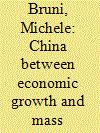

|
|
|
|
|
| Publication |
2013.
|
| Summary/Abstract |
In order to continue along its path of sustained economic growth, China will need, probably in just a few years, certainly after 2030, an extremely high number of immigrants. This conclusion, which contrasts with a recent World Bank scenario suggesting that the decline in labor supply due to demographic trends can be faced with sustained growth in productivity, is based upon a demand-driven model of migration. Moreover, according to the same model, the decline in fertility (and the one child policy that has been partially responsible for it) will end up provoking immigration flows above replacement level. The working age population and the total population will continue to increase, and China will remain the most populous country on the planet. The last part of the paper surveys the policies that China could adopt to reduce its structural need for foreign labor.
|
|
|
|
|
|
|
|
|
|
|
|
|
|
|
|
| 3 |
ID:
191309
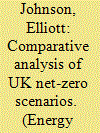

|
|
|
|
|
| Summary/Abstract |
Final energy demand in the UK has remained relatively constant since the 1970s. However, most of the scenarios that model pathways to achieve the UK's net-zero greenhouse gas emissions by 2050 indicate that energy demand reduction (EDR) will be an important pillar of climate change mitigation. Despite this, the UK Government has no clearly defined strategy to reduce demand. This comparative analysis explores the role of EDR across twelve UK-based climate scenarios from four organisations that estimate changes in carbon emission and energy consumption from 2020 to 2050. We focus on changes in final demand across the economy, assessing the scale of ambition and the implications for the rest of the energy system in the context of net-zero. All the pathways explored achieve reductions of at least 32.8% in total final energy demand from 2020 to 2050, suggesting that this is the minimum level of demand reduction required to achieve the development and rollout of the supply side technologies necessary to decarbonise the energy system. Reductions in total final demand of up to 52% are demonstrated. We find that pathways with higher levels of EDR mitigate against technological challenges, such as scaling up renewable energy capacities, are less reliant on carbon-dioxide removal technologies and require less investment – but are characterised by higher levels of social change.
|
|
|
|
|
|
|
|
|
|
|
|
|
|
|
|
| 4 |
ID:
150377
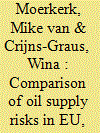

|
|
|
|
|
| Summary/Abstract |
For many countries, the inflow of energy is essential to keep economies running. Oil is typically considered to be the most critical fuel as an input for the petro-chemical and transportation sector and due to limited and less spread reserves. In this study external oil supply risks are assessed for the period up to 2035 for the European Union, United States, China, Japan and India (being the five largest importers of oil in the world), based on their current supplier portfolio. Scenarios are constructed for several climate policy and oil-supply projections.
It is found that risks increase strongly, when stringent climate policies are prevented from being implemented, especially when a peak in oil supply is taken into account, resulting in major oil supply-disruptions. China faces the lowest oil supply risks in most scenarios but the trends of India, China and US converge over time due to increasing import dependency of China and India. Japan faces high risks since the country has the highest oil import dependency combined with a low oil import diversification. For the EU, all figures are strongly influenced by Russia, accounting for 32% of total imports, and to a lesser extent Norway (11%), with high overall risks.
|
|
|
|
|
|
|
|
|
|
|
|
|
|
|
|
| 5 |
ID:
117040
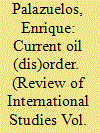

|
|
|
|
|
| Publication |
2012.
|
| Summary/Abstract |
This article has been constructed under the premise that International Political Economy provides the appropriate analytical tools for understanding the characteristics and performance of oil in economic and political relations. The article argues the need to articulate three levels of analysis (major players, scenarios, and exchange mechanisms) in order to understand the economic and political relations that underpin oil exchange during last decades. The central conclusion is that the current oil system is characterised by a set of asymmetric, unstable, and ungovernable relations, whose consequences are unpredictable but not necessarily traumatic.
|
|
|
|
|
|
|
|
|
|
|
|
|
|
|
|
| 6 |
ID:
125431


|
|
|
|
|
| Publication |
2013.
|
| Summary/Abstract |
This study assesses the prospects for presently available abatement technologies to achieve significant reductions in CO2 emissions from large stationary sources of CO2 in the EU up to year 2050. The study covers power generation, petroleum refining, iron and steel, and cement production. By simulating capital stock turnover, scenarios that assume future developments in the technology stock, energy intensities, fuel and production mixes, and the resulting CO2 emissions were generated for each sector. The results confirm that the EU goal for reductions in Greenhouse Gas Emission in the sectors covered by the EU Emission Trading System, i.e., 21% reduction by 2020 as compared to the levels in 2005, is attainable with the abatement measures that are already available. However, despite the optimism regarding the potential for, and implementation of, available abatement strategies within current production processes, our results indicate that the power and industrial sectors will fail to comply with more stringent reduction targets in both the medium term (2030) and long term (2050). Deliberate exclusion from the analysis of mitigation technologies that are still in the early phases of development (e.g., CO2 capture and storage) provides an indirect measure of the requirements for novel low-carbon technologies and production processes.
|
|
|
|
|
|
|
|
|
|
|
|
|
|
|
|
| 7 |
ID:
150791


|
|
|
|
|
| Summary/Abstract |
China is very active in the research and development of CO2 capture and storage technologies (CCS). However, existing estimates for CO2 storage capacity are very uncertain. This uncertainty is due to limited geological knowledge, a lack of large-scale research on CO2 injection, and different assessment approaches and parameter settings. Hence storage scenarios represent a method that can be used by policy makers to demonstrate the range of possible storage capacity developments, to help interpret uncertain results and to identify the limitations of existing assessments. In this paper, three storage scenarios are developed for China by evaluating China-wide studies supplemented with more detailed site- and basin-specific assessments. It is estimated that the greatest storage potential can be found in deep saline aquifers. Oil and gas fields may also be used. Coal seams are only included in the highest storage scenario. In total, the scenarios presented demonstrate that China has an effective storage capacity of between 65 and 1551 Gt of CO2. Furthermore, the authors emphasise a need for action to harmonise storage capacity assessment approaches due to the uncertainties involved in the capacity assessments analysed in this study.
|
|
|
|
|
|
|
|
|
|
|
|
|
|
|
|
| 8 |
ID:
177422
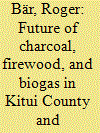

|
|
|
|
|
| Summary/Abstract |
Most households in sub-Saharan Africa rely on wood-based cooking fuels and their number is expected to rise. Despite this, national and subnational energy policies often neglect biomass cooking fuels. A Formative Scenario Analysis process is applied to show how the cooking fuel sector in Kilimanjaro Region (Tanzania) and Kitui County (Kenya) might evolve by 2030. In order to provide relevant knowledge for potential energy policies, this paper aims to identify the main drivers impacting the cooking fuel sector, and to assess and explore current and future demand and supply potential of biomass cooking fuels.
|
|
|
|
|
|
|
|
|
|
|
|
|
|
|
|
| 9 |
ID:
118826


|
|
|
|
|
| Publication |
2013.
|
| Summary/Abstract |
This paper develops scenarios whereby CO2 emissions from the transportation sector are eliminated worldwide by the end of this century. Data concerning the energy intensity and utilization of different passenger and freight transportation modes in 2005, and per capita income, in 10 different socio-economic regions of the world are combined with scenarios of population and per capita GDP to generate scenarios of future transportation energy demand. The impact of various technical options (improvements in the energy intensity of all transportation modes, changes in the proportions of vehicles with different drive trains, and a shift to biomass or hydrogen for the non-electricity energy requirements) and behavioural options (a shift to less energy-intensive LDV market segments, a reduction in total passenger-km of travel per capita, and an increase in the share of less energy-intensive passenger and freight modes of transport) is assessed. To eliminate transportation fossil fuel emissions within this century while limiting the demand for electricity, biofuels or hydrogen to manageable levels requires the simultaneous application of all the technical and behavioural measures considered here, with improvements in vehicle efficiencies and a shift to plug-in hybrid and battery-electric drive trains for light duty vehicles being the most important measures.
|
|
|
|
|
|
|
|
|
|
|
|
|
|
|
|
| 10 |
ID:
148265
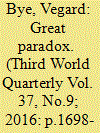

|
|
|
|
|
| Summary/Abstract |
US–Cuban normalisation currently taking place. The rapprochement process, culminating with President Obama’s historic visit in March 2016, has unleashed stiff resistance in both countries. The liberal democratisation paradigm is held up against what we have termed ‘socialist neo-patrimonialism’, with both seen as alternative tools for assessing the direction of social transformations underway in Cuba, focusing on the debate about the role of the national private sector. Paradoxically, normalisation with the USA may so far have had the contrary effect of what President Obama had in mind in this respect: judging from the 7th Congress of the Communist Party in April 2016, it seems that resistance against economic reforms has hardened, caused by a fear that Obama’s charm offensive, combined with a strengthened entrepreneurial sector, will undermine the entire revolutionary project. The article concludes with a discussion of four development scenarios.
|
|
|
|
|
|
|
|
|
|
|
|
|
|
|
|
| 11 |
ID:
177368
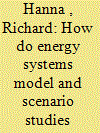

|
|
|
|
|
| Summary/Abstract |
Scenarios may be qualitative or quantitative, the latter of which can be developed using energy systems models. This study explores how different energy systems models and scenarios explicitly represent and assess potential disruptions and discontinuities. The focus is on futures studies and forward-looking scenario and modelling exercises. We apply definitions of ‘emergent’ (uncoordinated) and ‘purposive’ (coordinated) disruption to a systematic review on how energy systems models and scenarios have been used to capture disruption and discontinuity. We first conducted a review of reviews of energy models and scenarios to provide an overview of their common classifications. Additional searches then sought studies which use different types of models and scenarios to explore disruption and discontinuity. We analyse a subset of 30 of these modelling or scenario studies in which authors self-identify and represent disruption or discontinuity, finding that the most frequently used methods were qualitative, exploratory foresight scenarios or agent-based models. We conclude that policy makers could prepare more effectively for social, economic and political disruption by integrating multidisciplinary insights from social and political sciences, engineering and economics through a broader range of methods: exploratory, foresight scenarios, simulation and agent-based models and repurposed energy systems optimisation models.
|
|
|
|
|
|
|
|
|
|
|
|
|
|
|
|
| 12 |
ID:
121317


|
|
|
|
|
| Publication |
2013.
|
| Summary/Abstract |
Energy resources in Iran consist of the fourth largest oil reserves and the second largest natural gas reserves in the world. At present, due to political reasons, the investment trend does not go over well. Based on the Fifth Development Strategy, Iran needs $200 billion of investment in the country's first industry (i.e. oil), and given the objectives of the perspective document, the country needs more than $500 billion investment during the next 15 years. This paper examined Iran's energy status. Afterwards, oil future scenarios which developed by Research center of Iranian parliament, have been analyzed. Then four scenarios that express different modes of production and consumption are developed, namely: Thunder, Behemoth, Snowman, and Poor Addict. Finally, a comprehensive analysis for achieving the secure and sustainable future on the geopolitical, Geo-economic and Geo-cultural situation is presented.
|
|
|
|
|
|
|
|
|
|
|
|
|
|
|
|
| 13 |
ID:
126813


|
|
|
|
|
| Publication |
2014.
|
| Summary/Abstract |
Shell has been using scenario planning for 40 years to help deepen its strategic thinking. Developing and applying scenarios is part of an ongoing process in Shell that encourages decision-makers to explore the features, uncertainties, and boundaries of the future landscape, and engage with alternative points of view.
Shell scenarios go beyond conventional energy outlooks and consider long-term trends in economics, energy supply and demand, geopolitical shifts and social change. They are based on plausible assumptions and quantification, and include the impact of different patterns of individual and collective choices.
Shell's latest scenario publication, the New Lens Scenarios, published in 2013, provides an in-depth analysis of how economic, social and political forces might play out over the 21st century, as well as their consequences for the global energy system and environment. Its 'Mountains' and 'Oceans' scenarios set out two distinct paths the world might take in the decades ahead. They reinforce the urgency and complexity of addressing the world's resource and environmental stresses, and highlight the need for business, government and society to find new ways to collaborate, fostering policies that promote the development and use of cleaner energy, and improve energy efficiency.
|
|
|
|
|
|
|
|
|
|
|
|
|
|
|
|
| 14 |
ID:
109357


|
|
|
|
|
| Publication |
2011.
|
| Summary/Abstract |
This paper investigates the effects of policy, fuel prices and technological progress on the Austrian passenger car fleet in terms of energy consumption and greenhouse gas (GHG) emissions. To analyse these effects a simulation model is used. We model the car fleet from a bottom-up perspective, with a detailed coverage of vehicle specifications and propulsion technologies. The model focuses on the technological trend toward electrified propulsion systems and their potential effects on the fleet's energy consumption and GHG emissions. To represent the impact of prices and income on the development of the fleet, we combine the fleet model with top-down demand models.
We developed two scenarios for the time frame 2010-2050, using two different sets of assumptions for regulatory development and conditions of increasing fossil fuel prices and continuous technological progress in vehicle propulsion technologies.
The results indicate that material cuts in energy consumption and GHG emissions can be achieved with changes to the political framework for passenger cars. Appropriate taxation of fuels and cars can stabilise demand for individual motorised transport and lead to an improvement in vehicle efficiency by fostering the adoption of efficient vehicle propulsion technologies and low carbon fuels.
|
|
|
|
|
|
|
|
|
|
|
|
|
|
|
|
| 15 |
ID:
117223


|
|
|
|
|
| Publication |
2013.
|
| Summary/Abstract |
Low carbon scenario and transition pathway analysis involves the consideration of uncertainties around future technological and social changes. This paper argues that uncertainty can be better understood, and the strategic and policy effectiveness of scenarios or pathways thereby improved, through a systematic categorisation of the different kinds of certain and uncertain elements of which the future is comprised. To achieve this, this paper makes two novel methodological contributions. First it proposes a system conceptualisation which is based on a detailed description of the dynamics of the actors and institutions relevant to the system under study, iteratively linked to a detailed representation of the technological system. Second, it argues that as a result of developing this actor-based low carbon scenarios approach it is possible to characterise future elements of the system as either pre-determined, actor contingent or non-actor contingent. An outline scenario approach is presented, based on these two contributions. It emerges that the different categories of future element are associated with different types of uncertainty and each prompt different strategic policy responses. This categorisation of future elements therefore clarifies the relationship of scenario content to specific types of policy response, and thus improves the policy tractability of resulting scenarios.
|
|
|
|
|
|
|
|
|
|
|
|
|
|
|
|
| 16 |
ID:
171414


|
|
|
|
|
| Summary/Abstract |
The anticipated economic and population growth in India will increase demand for material resources, energy and consequently carbon emissions. The global ambition to limit global warming to 1.5 °C by the end of the century calls for rapid and unprecedented action. As the most carbon-intensive sectors, India's steel and cement industry will require a more transformative shift, both on the demand and supply side.
Strategies from both supply and demand-side are analysed for steel and cement sector to understand consequences for energy and emissions using two modelling approaches i) energy system and ii) material flow models. A portfolio of technically feasible options to reduce the material, energy and CO2 intensity is explored under four alternate scenarios spanning till 2050 differentiated by their mitigation ambition and development paradigm.
Results show that current policies in India will provide adequate incentives for achieving the climate targets India has submitted within its Nationally Determined Contribution (NDC) however, dematerialisation, reuse and recycling will be necessary for achieving the global ambition of 1.5 °C. The study concludes that a stringent carbon policy in combination with strong sustainability principles can reduce CO2 emissions by 68% in the steel and cement sector in 1.5 °C Scenario compared to NDC Scenario.
|
|
|
|
|
|
|
|
|
|
|
|
|
|
|
|
| 17 |
ID:
177323


|
|
|
|
|
| Summary/Abstract |
Coal consumption and production have sharply declined in recent years in the U.S., despite political support. Reasons are mostly unfavorable economic conditions for coal, including competition from natural gas and renewables in the power sector, as well as an aging coal-fired power plant fleet. Nevertheless, coal remains a major energy source in the North American energy markets. Supplementing EMF34 energy system analyses, we take a sectoral perspective to analyze coal's future role in this context. The U.S. Energy Information Administration as well as most models in EMF34 depict continuously high shares of coal-fired power generation over the next decades in their current policy scenarios. We contrast their results with coal sector modelling based on bottom-up data and recent market trends. We project considerably lower near-term coal use for power generation in the U.S. This has significant effects on regional coal production. Allowing new export terminals along the U.S. West Coast could ease cuts in U.S. production. Yet, exports are a highly uncertain strategy because the U.S. could be strongly affected by changes in global demand, for example from non-U.S. climate policy.
|
|
|
|
|
|
|
|
|
|
|
|
|
|
|
|
| 18 |
ID:
103351


|
|
|
|
|
| Publication |
2011.
|
| Summary/Abstract |
Aiming to lead amongst other G20 countries, the UK government has classified the twin energy policy priorities of decarbonisation and security of supply as a "centennial challenge". This viewpoint discusses the UK's capacity for energy modelling and scenario building as a critical underpinning of iterative decision making to meet these policy ambitions. From a nadir, over the last decade UK modelling expertise has been steadily built up. However extreme challenges remain in the level and consistency of funding of core model teams - critical to ensure a full scope of energy model types and hence insights, and in developing new state-of-the-art models to address evolving uncertainties. Meeting this challenge will facilitate a broad scope of types and geographical scale of UK's analytical tools to responsively deliver the evidence base for a range of public and private sector decision makers, and ensure that the UK contributes to global efforts to advance the field of energy-economic modelling.
|
|
|
|
|
|
|
|
|
|
|
|
|
|
|
|
| 19 |
ID:
150880


|
|
|
|
|
| Summary/Abstract |
For a particular community, what energy-related innovations constitute no-regrets strategies? We present a methodology to understand how alternative energy consuming activities and policy regimes impact on current and future liveability of socio-culturally diverse communities facing climate change. Our methodology augments the energy policy literature by harnessing three concepts (collaborative governance, innovation and political economic regime of provisioning) to support dialogue around changing energy-related activities. We convened workshops in Alice Springs, Australia to build capability to identify no-regrets energy-related housing or transport activities and strategies. In preparation, we interviewed policy actors and constructed three new housing-related future scenarios. After discussing the scenarios, policy and research actors prioritised five socio-technical activities or strategies. Evaluations indicate participants enjoyed opportunities given by the methodology to have focussed discussions about activities and innovation, while requesting more socially nuanced scenario storylines. We discuss implications for theory and technique development.
|
|
|
|
|
|
|
|
|
|
|
|
|
|
|
|
| 20 |
ID:
192719


|
|
|
|
|
| Summary/Abstract |
Marine renewables – which include mainly wave, tidal and current energy – have been hailed, for the past decades, as a potential solution to support the decarbonization of the society. Portugal and Spain have been traditionally avid for the testing and demonstration of such technologies, but the implementation of marine capacity is yet marginal, and there are many uncertainties regarding the future of the sector in the region. The main objective of this article is to show a future projection of marine renewable energies in both Iberian and Macaronesian regions for 2030 to research and technological development communities. To obtain this future projection, General Morphological Analysis and advanced clustering techniques have been used. The results are divided into five groups of potential scenarios, which vary significantly due to different political, social and technological parameters. The influence of variables such as innovation speed, infrastructure implementation, and comprehensive metocean data availability emerges as pivotal determinants shaping the sector's course. The knowledge from this systematization is expected to be used by researchers, technicians, governments or by any other agency involved in marine renewable energies in Spain and Portugal, as a guidance for their new projects and research lines.
|
|
|
|
|
|
|
|
|
|
|
|
|
|
|
|
|
|
|
|
|